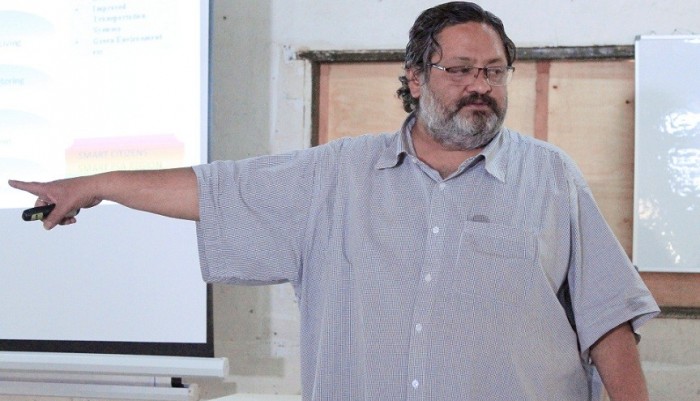
Apr
Basoga Nseete Students Association Prepares for Vibrant Handover Ceremony with Diverse Cultural Showcase
April 25, 2024, 4:58 pm
 Collins Kakwezi
Collins Kakwezi

KIU, Western Campus – Prof. Janrav Bajpai has told KIU Western Campus researchers that their researches should be geared towards making tangible impact on their and other communities.
He told them this during the second day of the Grants Training Workshop currently taking place in the Main Hall of KIU Western Campus and is aimed at skilling researchers in grants and proposal writing techniques.
“You have published 10 papers, so what? Have you opened up a business? Have you paid school fees for an orphan? Have you given anyone in need something to eat?” Prof. Bajpai asked.
“You have a Master’s Degree or PhD and you are driving around in a Land cruiser when there are people dying of hunger everyday in Somalia, or India or America or anywhere in the world. Why don’t you invest that money in a business and give people jobs and make more money?” he quizzed.
This followed the opening session of Day 2 of the workshop, which focused on the output component of research.
This was followed by the group sessions, where participants were tasked with forming groups, where they would come up with their research proposals, focusing on how to solve the problem statement.
Some of the presentations included;
1. “Development of a module to address interest and anxiety in learning science for female secondary pupils in Nigeria.”
2. “”Sustainable agriculture in Karamoja, Uganda: Organic farming and automated irrigation for better practices.”
3. “Deep re-enforcement learning for wearable sensor data in remote diabetic patients’ monitoring systems for real-time decision support.”
4. “Comparative studies on chronic Non-Communicable Diseases among slum dwellers in Kampala and Mbarara urban cities, Uganda.”
5. “Prevalence of obesity-associated factors and intervention outcomes in Bushenyi district.”
6. “Impact of community-based awareness on detection rates of cervical cancer among women residing in rural settings of Uganda.”
Participants went back and forth, counter-arguing and supplementing each other’s presentations and recommending amendments to them, something which impressed Prof. Bajpai.
“I like the way you are supplementing on each other’s ideas, one group advising the other. This adds an inter-disciplinary dimension to your ideas,” he commented.
The workshop continues tomorrow with Day 3.
Kampala International University,
Box 20000, Ggaba Road, Kansanga, Kampala